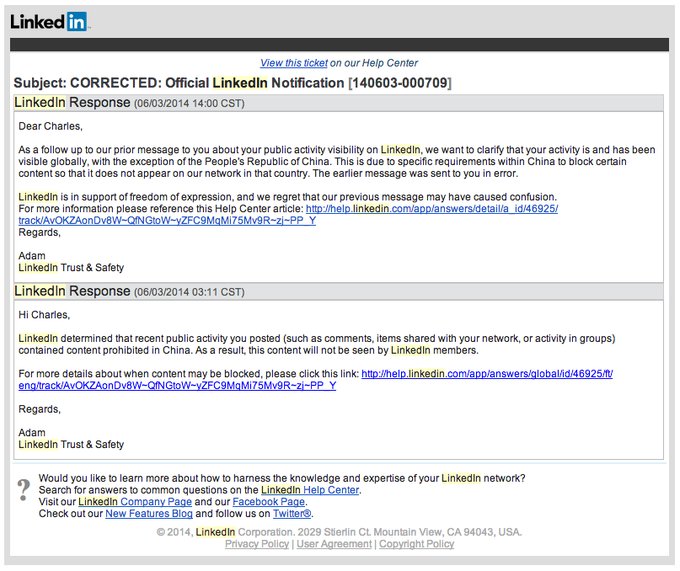TOM SIMONITE
Chinese tech companies such as search engine Baidu and social media platform Tencent block Tiananmen-related posts and pages to comply with the country’s authoritarian internet rules. Some US companies do their bit, too. Apple and Microsoftcensor information in China as a condition of accessing the country’s lucrative but circumscribed population of more than 800 million netizens.
For Microsoft, that means keeping content the government deems sensitive out of Bing search results and off of its business networking site LinkedIn. Apple polices its app store differently in China than in other parts of the world, at the government’s direction. The company has said that it removes VPN apps that could be used to bypass China’s so-called Great Firewall, which blocks access to many overseas sites. A tool launched in February by Greatfire.org, which monitors Chinese censorship, indicates that anonymity tools and apps about Tibet and Falun Gong that are available in versions of the app store around the world do not appear in China’s.
Both US companies declined to discuss their policies in China. Human rights groups, and lawmakers from the US and elsewhere, accuse them of helping to suppress rights they declare as essential in their home markets. “Following local laws is not a good excuse,” says Charles Mok, a Hong Kong legislator who was informed by LinkedIn in 2014 that a post referencing the Tiananmen anniversary would be censored in China.
Tiananmen-related online content is blocked year-round in China, and for decades textbooks and state media have ignored and sanitized the events of 1989. Each year’s anniversary is heralded by signs that companies and the government are policing the web more punctiliously.
In May, the Great Firewall blocked access to all versions of Wikipedia. Last year, AFP reported that it became impossible to send someone 89.64 or 64.89 yuan via Tencent’s dominant messaging service WeChat—apparently because those amounts could be read as encoding the date of the anniversary.
Apple may also have been thinking ahead. In April, Hong Kong media reported that the company had removed songs mentioning political topics from the Apple Music service in mainland China, including one by Hong Kong star Jacky Cheung that references the Tiananmen protests. Apple declined to comment on those reports. US lawmakers including Senator Marco Rubio (R–Florida) slammed Apple’s apparent compliance with China’s censorship regime as “disgraceful.”
Whatever your feelings about it, that regime has grown in sophistication as the internet has become more pervasive in China. Companies used to rely on a combination of simple blacklists of banned words and teams of manual reviewers. Those still play a role, but large companies such as Tencent now have more powerful automation to help identify what to block.
Tencent’s WeChat, which dominates mobile life in China, provides a handy example. Send a friend or group the “Tank Man” photo of a protestor holding only a plastic bag while facing down a convoy of armored vehicles in Tiananmen Square and it may never arrive. The app’s built-in censorship system can scan for a blacklist of sensitive images, says Jeffrey Knockel, a researcher at the University of Toronto’s Citizen Lab.
Knockel contributed to research last year that found WeChat can also look inside images to check any text—for example in an image meme—for sensitive content. The researchers reverse engineered the WeChat app to uncover that mechanism inside a section of the app called Moments, where users can share posts with a broad circle of friends, somewhat like Facebook. The image filtering also showed some ability to detect banned images that had been modified or resized.
“Following local laws is not a good excuse.”
CHARLES MOK, HONG KONG LEGISLATOR
Tencent’s project has other similarities with Facebook. The US company does not operate in China, despite CEO Mark Zuckerberg courting its leaders. But Facebook has also developed software that reads text inside images, as part of efforts to block hate speech. At both Chinese and US social networks, the automatic filters are far from perfect.
Knockel says China’s censorship system is less an impermeable barrier and more of a “kluge”—a patchwork of scrappy systems built by companies apparently aspiring to do the minimum necessary to meet government expectations. “I think they want to implement it barely enough that they don’t get into trouble,” he says.
All the same, there’s evidence that the kluge works. US teens are warned that the internet never forgets youthful indiscretions. China’s censorship experiment suggests that if you force the internet to forget, a society may develop amnesia.
In December, researchers at Peking and Harvard Universities published results from a controlled experiment in which 900 Chinese students received an unfiltered connection to the outside world. Those given a chance to sidestep censorship displayed little interest in blocked sites and information.
“It’s not the case that people are hungering for banned content,” says Jennifer Pan, a Stanford professor who studies the digital strategies of autocratic regimes. “You could say the system has worked in that people don’t know what they're missing and don’t demand it.” It helps that China’s vast internet industry provides plenty of government-compliant content and services, she says.
Since coming to power in 2012, China’s President Xi Jinping has tightened the Communist Party’s control of the country’s economy, society, and internet. Restrictions on foreign and domestic media have increased, and the United Nations says that as many as 1 million Uyghur Muslims in China’s northwest are being held in internment camps.
In 2014, a new body called the Cyberspace Administration of China unified internet regulation under the president’s direct control, says Chris Meserole, a fellow at the Brookings Institution. He says Xi’s regime views the internet as a tool for surveillance and suppression as much as communication.
Apple and Microsoft must deputize themselves to that regime to operate in China. Microsoft has offered, and censored, Bing results in China since 2009 and picked up additional censorship obligations in 2016 with the acquisition of LinkedIn.
The service had entered China as a startup in 2014, arguing in a blog post that although the company “fundamentally disagrees with government censorship,” staying out of China would hold back its people from accessing “the economic opportunities, dreams and rights most important to them.”
Apple has also claimed that censoring for the Chinese government encourages greater freedoms. In 2017, the company’s policy chief, Cynthia Hogan, wrote to two senators that Apple’s presence in China “helps promote greater openness and facilitates the free flow of ideas and information.”
Charlie Smith, a pseudonymous cofounder of Greatfire.org, which monitors Chinese censorship, says US giants working with Chinese censors in fact strengthens Xi’s controlling regime. “Companies who have bowed down to surveillance and censorship in China have helped to make it easier for the authorities to convince other foreign companies to do the same,” he says.
Google admitted last year that it was testing a search engine, codenamed Dragonfly, that would comply with Chinese censorship. The company had offered censored search inside China until 2010, when it withdrew amid concerns the government was restricting online speech too much. CEO Sundar Pichai told Congress in December that the company has “no plans” to launch such a project, but also left the door open to that changing.
The company does offer a mobile game and translation app inside China—services that don’t have the same censorship liabilities of search. When Doriane Lau, a researcher at Amnesty International, tested the translation app with a paragraph describing the persecution of Uyghurs, Google’s app handled the text without protest.


No comments:
Post a Comment